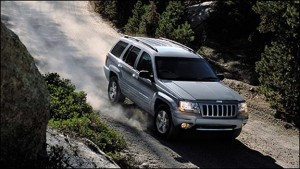Chrysler is recalling over 919,000 Jeep Grand Cherokee and Jeep Liberty SUVs worldwide due to a potential defect that can cause their airbags to unexpectedly inflate while the vehicles are being driven.
A total of 775,000 older versions of the two Jeep models will be impacted in the U.S., along with 49,000 sold in Canada, 22,000 in Mexico and the rest distributed to other global markets. While the National Highway Traffic Safety Administration says the problem has not led to any accidents there have been a number of minor injuries caused by the inadvertent airbag deployments.
The latest recall adds to the growing tally of safety actions related to airbag safety defects. Ford, Honda and Hyundai are among the list of other makers who have been affected in recent years.
NHTSA reports that the Jeep problem involves Grand Cherokees produced in the 2002 through 2004 model-years, and Liberty SUVs produced in 2002 and 2003. According to the safety agency, the problem has been linked to a defective part in the computer used to control the airbags.
Under normal circumstances, airbags rely on a network of sensors that indicate when and where a collision has occurred – and on more recent models, sensors also detect the severity of a crash and where occupants are sitting in the vehicle. The Jeeps involved in the recall may see their front or side-impact airbags inflate even if they aren’t involved in a collision. Pre-tensioning seatbelts may also be triggered.
A Chrysler spokesman noted that the problem has occurred in less than three-hundreths of a percent of the Jeep Liberty and Grand Cherokee models on the road.
Nonetheless, after completing a year-long investigation, NHTSA determined the problem occurred 215 times, causing 81 minor injuries – but while the inadvertent airbag deployments have not been linked to any crashes, the safety agency warns that drivers could be startled into losing control of their vehicles.
Chrysler says it plans to notify owners by January and repairs will be made to the electrical system at no charge to consumers.
Automotive manufacturers have seen a number of airbag issues pop up in recent years forcing them to recall large numbers of vehicles. In July, Hyundai recalled 220,000 Sonata sedans and Santa Fe SUVs from the 2007 to 2009 model-years because sensors designed to protect small children in an airbag deployment might not work. The maker also recalled nearly 23,000 late-model Sonatas for a separate airbag problem.
Ford announced the recall of 154,000 Fiesta models due to airbag problems last month, and the maker previously called back 1.5 million vehicles – including 1.2 million F-Series pickups – due to unexpected airbag deployments.
Honda, meanwhile, has recalled over 2.5 million vehicles sold through the Honda and Acura brands because they could deploy with too much force, sending deadly shrapnel into the passenger compartment. The problem was linked to at least two deaths.
Separately, federal law enforcement officials and safety regulators have teamed up to crack down on scam artists selling counterfeit replacement airbags that could fail to deploy or inflate improperly.
(For more on that story, Click Here.)
Because of the potential dangers, NHTSA has put a high priority on discovering and fixing airbag problems.

